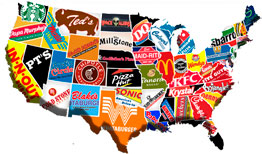 As Gordon Brown urges Brits to reduce the amount of waste that goes into landfill, would a return to World-War style rationing and cooking not only reduce wastage, but also help to shrink the UK’s bulging waistlines and the environment in the process?
As Gordon Brown urges Brits to reduce the amount of waste that goes into landfill, would a return to World-War style rationing and cooking not only reduce wastage, but also help to shrink the UK’s bulging waistlines and the environment in the process?
Food rationing came into effect back in February 1918 during World War One. However, there are many lessons that can be learnt in order to benefit today’s wasteful society.
Although food was scarce back then and the black market profited from other people’s misfortunes, the fitness of the UK population was at an all time high, with food wastage and obesity barely an issue as every bit of food was put to good use and each meal was planned out to be as nutritional as possible.
Today, with families in the UK wasting on average £416 worth of perfectly good food per year, perhaps it is time to reduce the amount of food imported from distant continents and start to be become more self sufficient in order to help future generations in the UK? However due to cultural changes and a lack of free time, more people are resorting to the quick fix ready meals that have made modern society lazy during a period of economic instability.
As food prices continue to rise sharply due to economic and social factors; including bio fuel products, high petrol prices, an increasing global population and poor harvests, a return to old fashioned prudent shopping or rationing maybe the only solution in beating the bulge and cutting costs.
With the last case of food rationing being recorded in June 1954, families during these hard times had struggled every day to provide for the entire family. However, compared to today’s mindset - one which has been warped by the supermarkets "best before date" labelling that encourages waste, even though food items are perfectly fine for some time after these exaggerated sell by dates - perhaps people should remember what their grandparents told them and make sure to empty their plates and eat their greens.
The British Government's current 'reduce, reuse and recycle' drive does not only apply to plastic bottles and cans; planning weekly meals and using leftovers is also good advice which people should all take more to heart for a number of reasons. Just because shop fittings dominate the super markets, does not mean peoples' fridges need to be dominated by food.
Families who currently do not plan for the week can not only help the environment, but there would be less need for people to purchase convenience fast foods; most of which has a high fat content and is a contributory factor to the UK's obesity "epidemic" - a problem which was practically non-existent back in the early 1900’s. Not only has there been an increase in obesity rates, but according to The Times newspaper, there has been a dramatic increase in Type One diabetes in children as a result of the ignorance of parents and the poor diets that are put upon them.
Reducing the country's waste is not something that will happen over night, but perhaps people should look back to war-style rationing to reduce their impact on the environment as well as their pockets.








Leave a comment